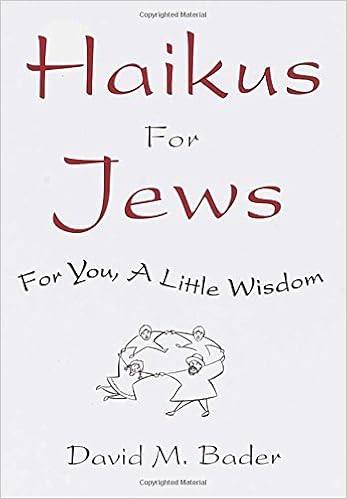
Haiku (俳句) About this sound listen (plural haiku) is a very short form of Japanese poetry. It is typically characterized by three qualities:
The essence of haiku is "cutting" (kiru). This is often represented by the juxtaposition of two images or ideas and a kireji ("cutting word") between them, a kind of verbal punctuation mark which signals the moment of separation and colours the manner in which the juxtaposed elements are related.
Traditional haiku consist of 17 on (also known as morae though often loosely translated as "syllables"), in three phrases of 5, 7, and 5 on, respectively.] (An alternative form of haiku consists of 11 on in three phrases of 3, 5, and 3 on, respectively.)
A kigo (seasonal reference), usually drawn from a saijiki, an extensive but defined list of such terms.
Of all the many forms of Jewish-Japanese poetry, the Jewish haiku is perhaps the most sublimely beautiful," begins the foreword to the wickedly funny and tirelessly bizarre Haikus for Jews by David M. Bader. If you can't abide a little fun with stereotypes, read another book. But if you don't mind a little ribbing, take a look at the following haiku, which gives only a mild taste of the yummy-as-lox treats gathered in this collection:
Jewish voodoo tip
mention an acting career,
then watch for chest pain.
And if you liked that, you'll love this:
Lightbulb out again --
how many of us must meet
to change it this time?"
And they just keep getting better.
Why is this haiku book different from all other haiku books?
For centuries, the Japanese haiku has been one of the world's most dazzling poetic forms. In just three short lines, it captures the sublime beauty of nature--the croak of the bullfrog, the buzzing of the dragonfly, the shriek of the cicada, the scream of the cormorant. Now, with Haikus for Jews, there is finally a collection that celebrates the many advantages of staying indoors.
Inspired by ancient Zen teachings and timeless Jewish noodging, this masterful work is filled with insights that will make you exclaim, "Ah!" or at least "Oy!" Whether you are Jewish or you simply enjoy a good kosher haiku, these chai-kus (so called because of their high chutzpah content) are certain to amuse. What's more, with each poem limited to seventeen syllables, Haikus for Jews is perfect for people in a hurry. Find out why God has made these The Chosen Haikus.
No comments:
Post a Comment